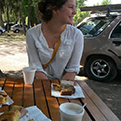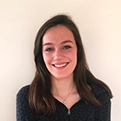Student Testimonials
-
Elise Gruber
 After coming back from studying abroad in Argentina, I became involved in CBL as a means to connect myself to a community Richmond I was completely unaware and feel the sense of bold vulnerability of speaking a second language that I craved from abroad. It quickly became one of the highlights of my week, as the students and teachers that I met were so kind, appreciative, and patient with me, a stranger coming into their life for several hours a week with the common goal of easing the difficulty of learning a second language in the strenuous situation of a recent immigrant. I felt I gained so much as an ESL tutor and was grateful to be connected with Dr. Vazquez, the director of the Community Based Learning program, constructing a senior capstone that analyzed the impact and efficacy on the three prongs of UR’s CBL program on students, peer tutors, and teachers. This project provided incredible insight into the broad scope of impact both participants receive and hold in such a program. In Huguenot High School specifically, the ESL program is completely beyond its capacity, turning teachers into babysitters further estranging teenage students already transitioning to a new home, language and culture. As documented in my senior capstone, CBL participants taking the time to learn the hometown of a student or review confusing lessons or creating an informative presentation for ESL parents or designing a museum tour in Spanish granted an opportunity for personal connection and understanding between individuals who would have otherwise remained strangers and facilitated existing and forged new avenues to access social and cultural capital for ESL students. Following graduation in May of 2017 I decided to pursue medicine and hope to continue to use Spanish to serve minority communities. I have since been working as a Spanish interpreter at a medical clinic in Charleston, SC and have similarly found this to be a very rewarding experience.
After coming back from studying abroad in Argentina, I became involved in CBL as a means to connect myself to a community Richmond I was completely unaware and feel the sense of bold vulnerability of speaking a second language that I craved from abroad. It quickly became one of the highlights of my week, as the students and teachers that I met were so kind, appreciative, and patient with me, a stranger coming into their life for several hours a week with the common goal of easing the difficulty of learning a second language in the strenuous situation of a recent immigrant. I felt I gained so much as an ESL tutor and was grateful to be connected with Dr. Vazquez, the director of the Community Based Learning program, constructing a senior capstone that analyzed the impact and efficacy on the three prongs of UR’s CBL program on students, peer tutors, and teachers. This project provided incredible insight into the broad scope of impact both participants receive and hold in such a program. In Huguenot High School specifically, the ESL program is completely beyond its capacity, turning teachers into babysitters further estranging teenage students already transitioning to a new home, language and culture. As documented in my senior capstone, CBL participants taking the time to learn the hometown of a student or review confusing lessons or creating an informative presentation for ESL parents or designing a museum tour in Spanish granted an opportunity for personal connection and understanding between individuals who would have otherwise remained strangers and facilitated existing and forged new avenues to access social and cultural capital for ESL students. Following graduation in May of 2017 I decided to pursue medicine and hope to continue to use Spanish to serve minority communities. I have since been working as a Spanish interpreter at a medical clinic in Charleston, SC and have similarly found this to be a very rewarding experience. -
Rachel Kleiman
 From the first time I caught a glimpse of the title in the course listing, I was both intrigued and excited by the prospects of “Spanish in the Community.” As someone who first became passionate about Spanish through travel, I love being able to test and expand my knowledge of the Spanish language beyond the classroom. I was drawn to this class, having never encountered a language class with such an integral component in outward community work...needless to say, this class was the most memorable of my freshman year. For my service component, I had the opportunity to serve as a tutor for two students at Bon Air elementary school. Somewhere, in the midst of our weekly meetings full of math problems and grammar lessons and exchanging stories, I was confronted with a realization. Prior to this experience I was unaware of just how many ESL students were struggling at Richmond public schools from a young age, and subsequently falling further and further behind. Nonetheless, I was inspired by the impact that I was able to make on just two students throughout a single semester. I began to learn more about the issue, and decided to become a member of Scholars Latino Initiative, where I currently serve as three-year mentor to a Latina student, guiding her through high school and helping her to prepare for the college application process. I have found such meaning and joy in working with my mentee and other students in the program--being able to see how my work is actually going to impact these students at such a critical point in their education and lives has become invaluable. I am so grateful that “Spanish in the Community” exposed me to a whole world of need and opportunity that I might not have been a part of otherwise.
From the first time I caught a glimpse of the title in the course listing, I was both intrigued and excited by the prospects of “Spanish in the Community.” As someone who first became passionate about Spanish through travel, I love being able to test and expand my knowledge of the Spanish language beyond the classroom. I was drawn to this class, having never encountered a language class with such an integral component in outward community work...needless to say, this class was the most memorable of my freshman year. For my service component, I had the opportunity to serve as a tutor for two students at Bon Air elementary school. Somewhere, in the midst of our weekly meetings full of math problems and grammar lessons and exchanging stories, I was confronted with a realization. Prior to this experience I was unaware of just how many ESL students were struggling at Richmond public schools from a young age, and subsequently falling further and further behind. Nonetheless, I was inspired by the impact that I was able to make on just two students throughout a single semester. I began to learn more about the issue, and decided to become a member of Scholars Latino Initiative, where I currently serve as three-year mentor to a Latina student, guiding her through high school and helping her to prepare for the college application process. I have found such meaning and joy in working with my mentee and other students in the program--being able to see how my work is actually going to impact these students at such a critical point in their education and lives has become invaluable. I am so grateful that “Spanish in the Community” exposed me to a whole world of need and opportunity that I might not have been a part of otherwise. -
Sabrina Duarte
I am very grateful to have had the opportunity in being part of the Spanish Community-based Learning program. Through Spanish CBL, I volunteered as an ESL tutor at Huguenot High School. The hands-on learning provided me the experience to connect the concepts learned in class with what I saw in the classroom in our local community of Richmond, VA. Through volunteering, I was able to challenge my skillsets in teaching while also improving my ability to communicate in Spanish. Not only did I have the opportunity to help the students in class, but I had the privilege of creating a friendship; it was rewarding all in itself to watch a student’s face light up with victory when they began to understand a lesson or successfully solved a math problem independently. I personally grew from the experience, allowing myself to be more open-minded and creative when presented with a challenge, and I also came to understand the importance of working with others to improve the community as a whole. The Spanish CBL provided me with the opportunity to be exposed to cultures, characters, and challenges I would not have had the chance to see or experience if I did not volunteer. After working with these students, I felt a rewarding sense of shared accomplishment.
-
Madelyn Lent
Participating in CBL has been the most eye-opening experience I’ve had since arriving at the University of Richmond. During my CBL experience I worked with kindergarten students in the ESL program at Bon Air Elementary school. The students I worked with varied significantly in their abilities to communicate in both Spanish and English, and I was charged with enhancing their English speaking, reading, and writing skills. While I thoroughly enjoyed working with the students during my time there, I was disturbed by the fact that the school lacked educators who are fluent in Spanish, and that emphasis was not placed on enhancing the student’s Spanish speaking, reading, or writing skills. Some of the students I worked with were already more fluent in English than they were in Spanish, and I could tell from observing the older students that the same would soon be true for many of the students who at that point had relatively equal English and Spanish communication abilities. These observations were very disheartening to me as they indicated that the school system was preventing students from achieving true bilingualism by denying them access to education in Spanish. I have heard some defend the current state of affairs by saying that “it is not the school’s responsibility to educate students in their first language as well as English”. This is, however, a poor defense. It is a school’s responsibility to provide students with the educational tools to become the best possible version of themselves. If a student walked into the first grade with the ability to do 8th grade level algebra, the school would be negligent if it did not provide that student the resources they needed to continue to enhance their abilities in mathematics. I believe the same is true for language. We have a significant number of children entering the Virginia Public School System who have been exposed to Spanish from a very young age and who could, with the right resources, become strong bilingual speakers, readers, and writers. I strongly believe that such resources should be invested in and will continue to look for ways to advocate for such investments during my time at Richmond and beyond.